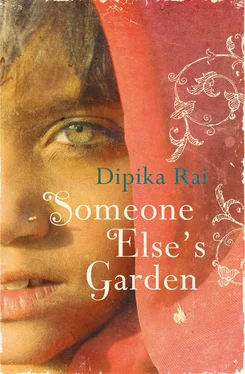Singh Sahib does nothing to curb the hatred that lodges in his throat making it difficult for him to breathe.
‘You leave him alone!’ Asmara Didi accosts Ram Singh outside the door. ‘Remember, I brought you into this world.’
‘Yes, you keep telling me so . . . So damned what, do you think you can take me out of it too?’
‘It would have been better if she’d never had you!’ says Asmara Didi, surprised at her brutality. ‘Your father loves you, I wish you could see that.’
‘Yes, he loves me so much that he never wants to see my face.’
‘That’s not true! Don’t you remember how the two of you used to eat dinner together every night? It was always Lokend who didn’t have his attention.’
‘Lokend may not have had his attention then, but he certainly has his love now.’
‘Give him a chance, won’t you . . .’ she says, visibly softening. ‘He is in a bad way. When your amma died, he stopped living too . . .’
‘He better have, it was he who killed her. She was too good for him.’
‘Ram Singh! Your father loved Bibiji more than life itself,’ she says. ‘A love like that is fraught with danger, it can be very fragile . . . but you wouldn’t understand . . .’
‘He went with other women till she died of a broken heart.’
‘No . . . she was weakened by her breathing sickness,’ she says, shaking her head. ‘She was very weak, she couldn’t handle the strain of bearing a second child,’ she reiterates, trying to convince herself as much as Ram Singh. In her opinion it was misguided jealousy that killed Bibiji, not childbirth.
It was a cruel trick of providence that had placed Bibiji at the window the day Singh Sahib put his hands on the shoulders of a village woman waiting under the spreading mango tree. The woman, one of his numerous bachelor dalliances, had come to ask for money to go to the city. Singh Sahib had grabbed her shoulders to impress upon her never to come to his home again. The woman may have been no one to him, but for Bibiji she was her nemesis, sent by the gods to quell her laughter and teach her the one universal truth: Nothing is Permanent.
That day an alien loneliness, thus far held at bay by her husband’s love, rushed up and grabbed Bibiji by the throat. All her loneliness and desolation attacked her, and for the first time since she had arrived at the Big House she regretted her superior marriage that made her unfit to return home. After that, she lived in constant fear, her stomach balled up so tight that she was unable to eat. Day after day, the situation received sustenance from the placenta of her imagination. Her love became desperate. In his absence she found herself cleaning all her husband’s things in a frenzy, just to be close to him. She lay alert and unsleeping night after night thinking her self-cruelty would give her resilience, but it only intensified the pain. More and more, she spent long hours at her open window gazing into the fields, closing it only on the days when the maddened dust came to visit Gopalpur, accepting her situation, having nowhere to go and nothing to change. That’s when she’d started having the midnight attacks which left her breathless and half-conscious.
‘What do you know? You were only four when she died,’ says Asmara Didi. ‘Did you know your mother was a commoner, a mere village girl, but still he married her. He went against his whole family, this village, tradition, to bring her into this house. She didn’t have children for many years, and he could have taken another wife, but he didn’t.’
‘Maybe he should have taken another wife, then she might be alive today . . .’ Ram Singh misses his mother in that gruff way of tough men who can never acknowledge their feelings.
‘Your mother was – no, is, your father’s entire world. She was simply too suspicious of her good fortune, she couldn’t accept her destiny. She was so lovely, so delicate, so lonely, so weak . . . Everyone has a story, Ram Singh, mark my words; each of us has our own burden.’
‘Huh, each one of us, indeed, except my perfect brother, damn him, and that godawful mongoose of his.’
‘You used to keep mongoose pups too, you know. After your mother died you spent all your time beside a wooden crate hidden behind the cowshed which held four abandoned mongoose pups. Their eyes just barely open, you kept them alive on a rag dipped in milk.’
‘Do you really expect me to believe that?’ he says, his voice wavering. Of course he remembers. He remembers vividly. It was on one of those dank days when the clouds were distended over the fields, stretched big and fat with rain, that he thought he would make the world right for his grieving widowed father. He’d brought one of his pet mongoose pups into his father’s despondent room, walking heel to toe like a thief in a vaudeville act, and quickly placed the pup in his father’s hands before thought could change his mind. Then he’d run to the safety of the darkest corner in the room to hide behind the curtains, believing his father would be fooled into thinking the present came from the heavens if he hid well enough. He’d watched secretly as the pup arranged itself into a confident ball, so tiny that it was no more than a bony warm feeling in those massive palms. He had wanted to leap out from behind the curtain straight on to his father’s lap, but before he could make a sound his father dropped the pup on the floor. The spell was broken and Ram Singh knew not to declare himself.
‘You are free to believe what you want.’
‘Amma died, but not me, I was alive, I am still alive – when will he see me ? Honour before Life. My God, what does that man in there know about honour then?’
The chill has returned to the air. It enters Singh Sahib’s good leg and spreads through his body like ink on blotting paper. Asmara Didi is back to light the fire. ‘Leave h . . . it,’ he says. He can’t get his temperature just right with the fire going. It’s comfortable for a while, then too hot to bear. Of course Singh Sahib could keep a retinue of constant servants by his side to move him around the room, if he so wished, but he doesn’t. He wants to be alone, as do all the guilty. He can just about stand to be in the company of Asmara Didi, and that too for very short periods.
‘Lokend has gone back to the bandits. Hai, when will he learn? After they have lopped off his obstinate head in one swift stroke? As if those scoundrels need our help now, after they’ve ravished our fields and raped our women . . .’ Asmara Didi’s chastisement contains more pride than anything else. It is a description of Lokend’s foolish courage, with the emphasis on courage. ‘Through and through he’s your son . . .’ Far from the truth, her words die on her lips. In fact, every cell in Lokend’s body proclaims him as his mother’s son, even though Bibiji never had a chance to hold him. She never recovered from childbirth, and when Lokend was only four weeks old, she died with a soft sigh. All joy died with her and the Big House’s fate as a place of sadness and guilt was sealed.
The memory of that time still brings a shudder to Asmara Didi’s frame. Overnight Singh Sahib’s skin began to hang on him like baggy wet clothes two sizes too large, and prayers and incense ruled the Big House, lodging deep inside cupboards, up trees, under quilts and in each and every vessel in the kitchen. Ram Singh and his father had their heads shaved so all the world would know of their grief.
After that, Singh Sahib never left his room and refused to see his younger son, whom he blamed for his mother’s death. The little Lokend, talking in a language oiled with m’s, had only Asmara Didi. When he said Am-m-ma for the first time, Asmara Didi was tempted to let the word fly free on shimmering wings right into her waiting ear to fill the child-lonely spot in her heart. But she couldn’t. ‘Not Amma,’ she’d said, ‘Didi.’ There is a reason why mothers are called Amma. It was much harder for the boy to say didi, elder sister, it was a word learnt, not like amma, which sprang from his soul unsolicited. But she was more than a mother to him.
Читать дальше












